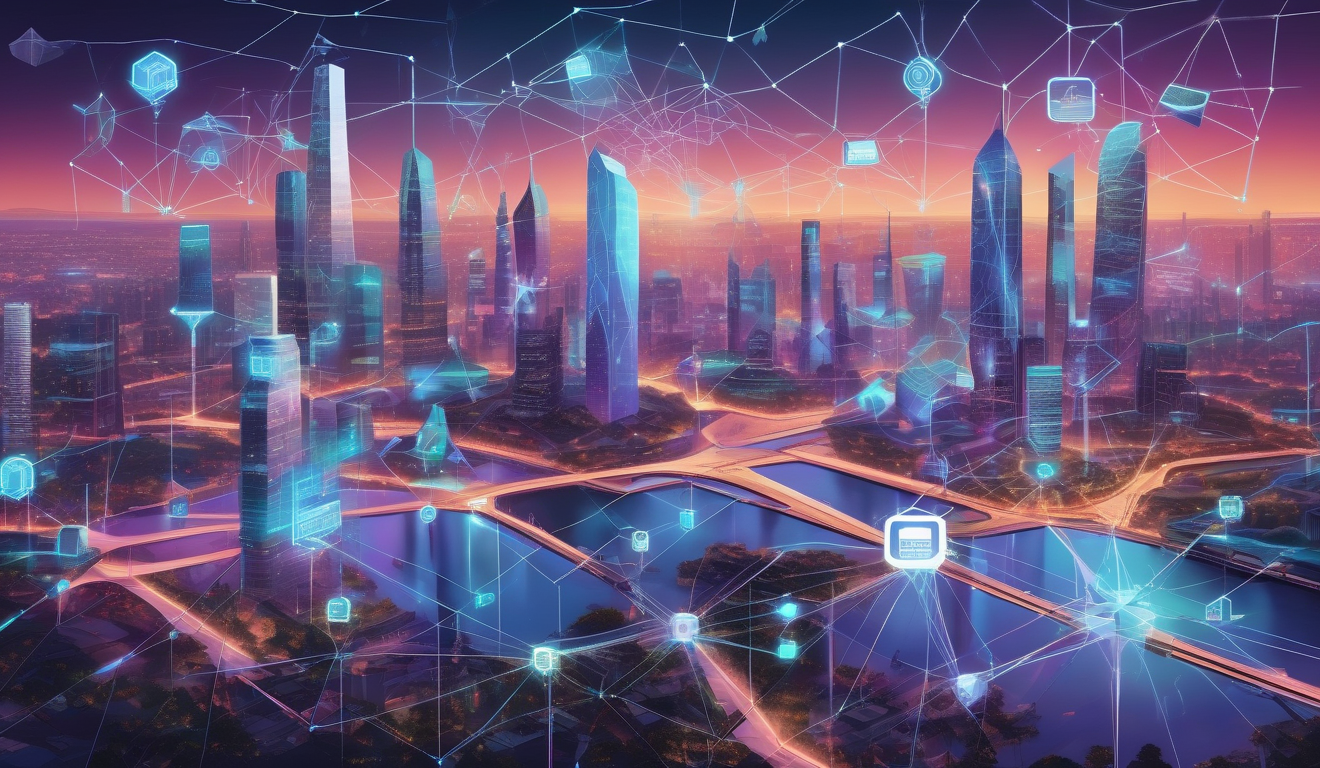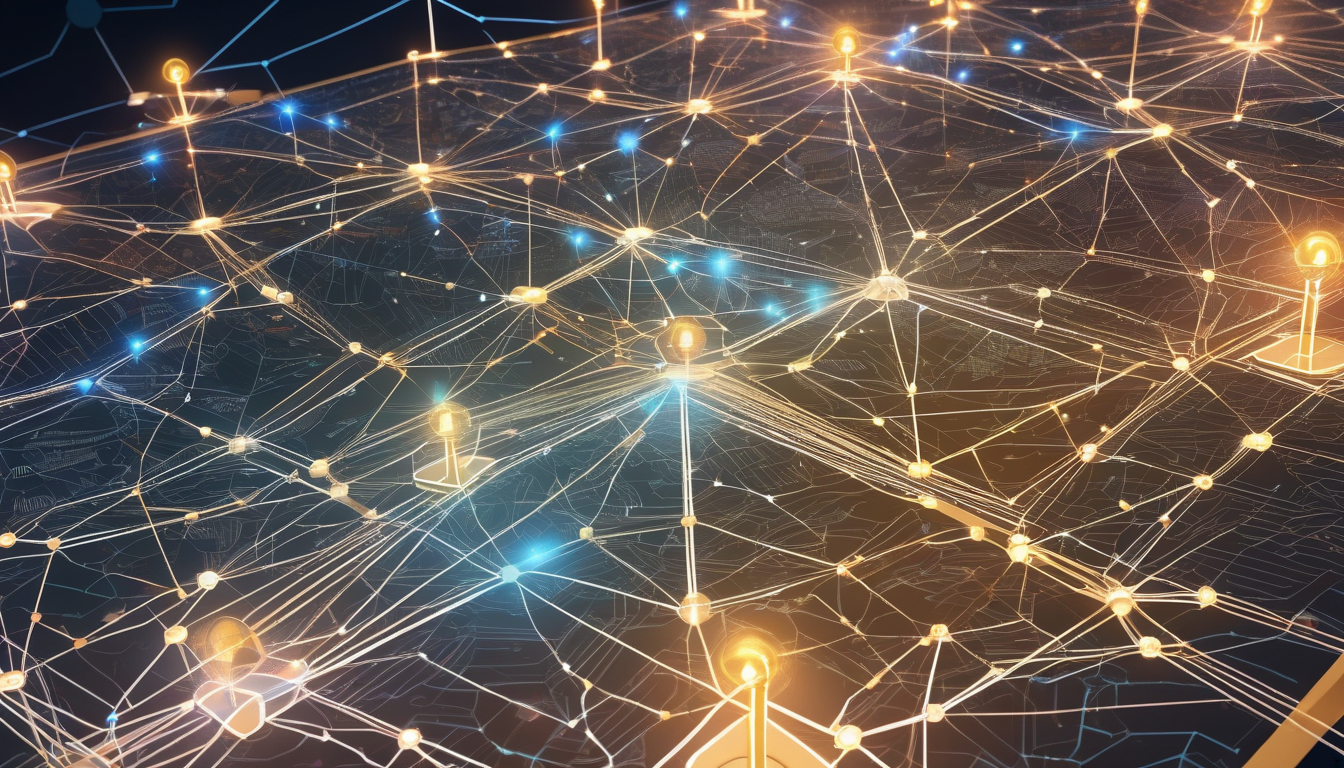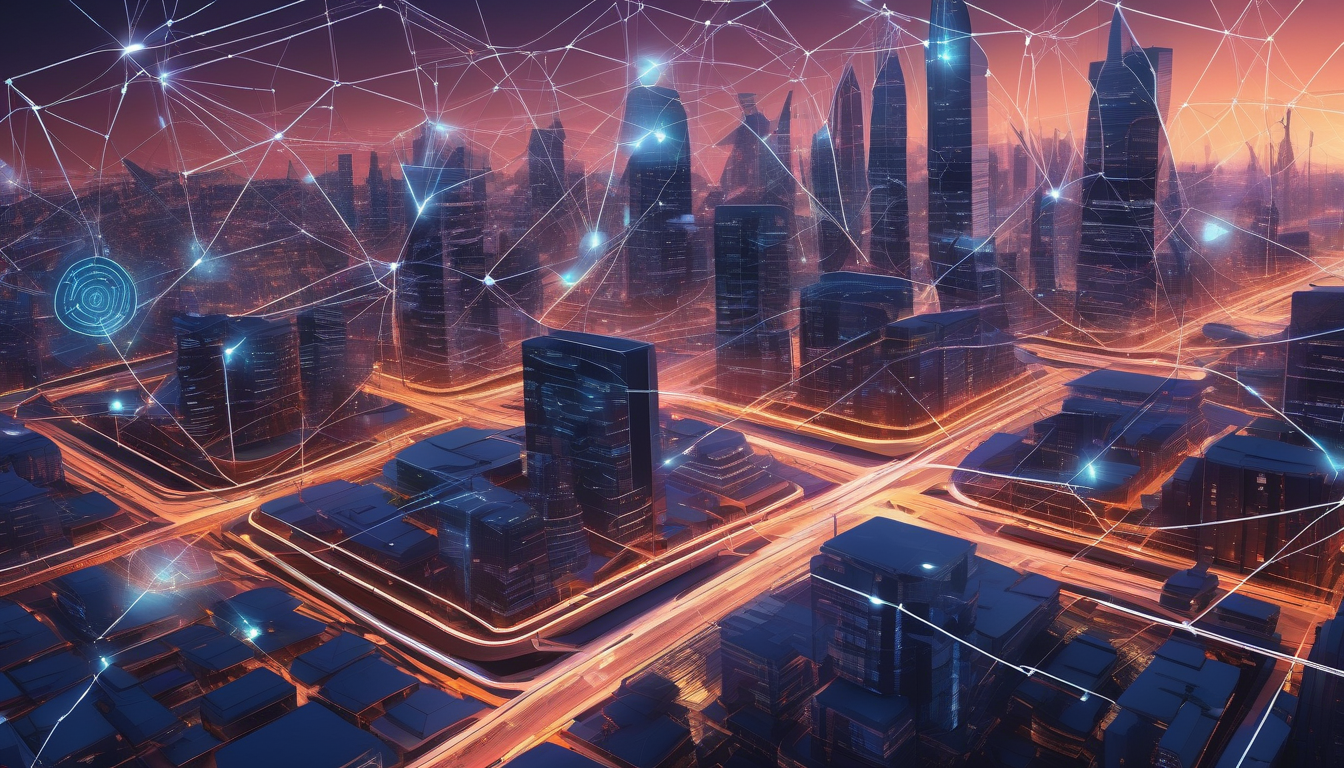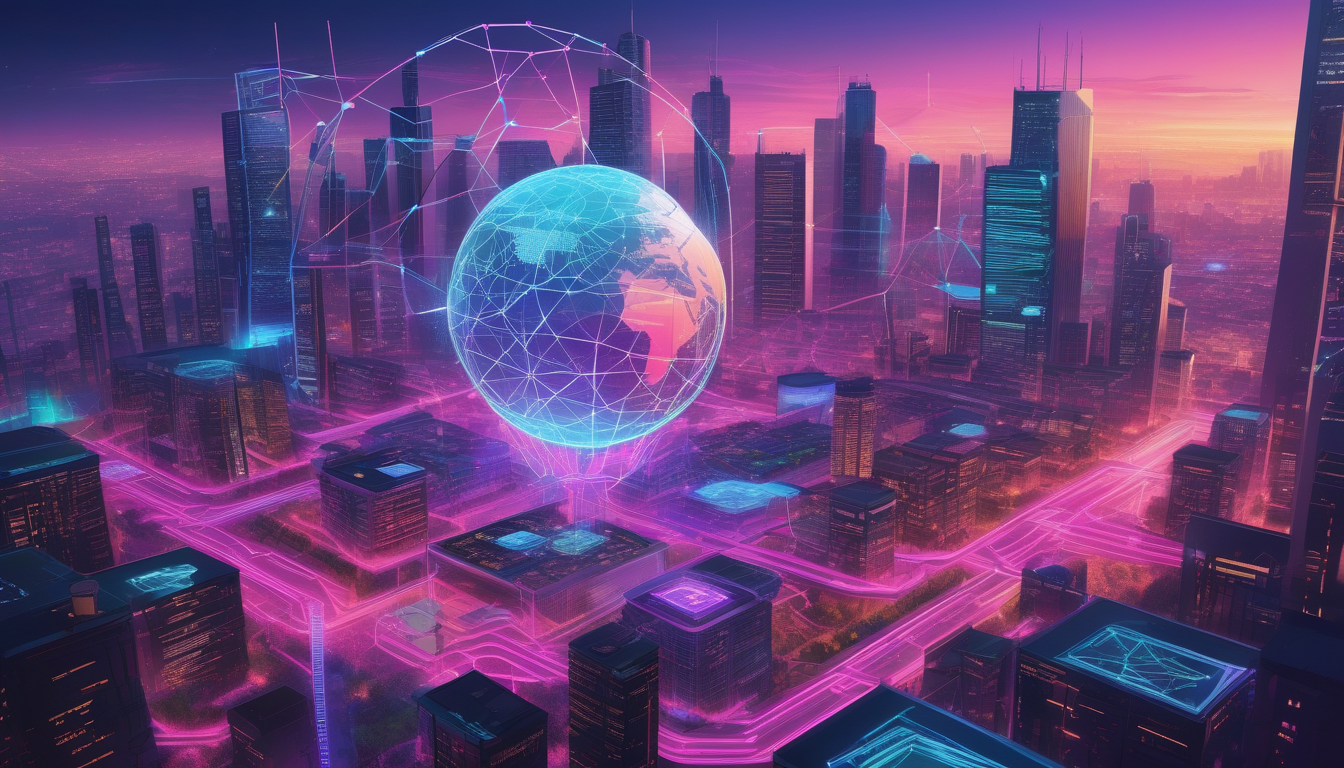Is Decentralized Tech the Future of the Internet?

As we navigate through the digital landscape, the question arises: Is decentralized technology the future of the internet? This concept is not just a buzzword; it’s a revolutionary shift that could redefine how we interact online. Imagine a world where your data isn’t stored in a single, vulnerable location but is instead spread across a network of computers. This is the essence of decentralization, and it brings with it a wave of possibilities and challenges.
Decentralized technology, often associated with blockchain and peer-to-peer networks, promises to enhance privacy, security, and user autonomy. Unlike traditional systems where a central authority governs data flow, decentralized platforms empower users to take control of their personal information. Think of it as a community garden where everyone contributes and benefits, rather than a corporate farm where profits dictate the rules.
However, the road to a decentralized future is not without its bumps. There are significant hurdles to overcome, such as scalability issues and regulatory concerns. For instance, while decentralized systems offer enhanced security, they must also find ways to scale effectively to accommodate a growing user base. This is akin to a small-town library expanding into a metropolitan library; the infrastructure needs to evolve without losing its core values of accessibility and community service.
Moreover, as we explore the future of decentralized technology, we must consider its potential societal impacts. Will it lead to a more equitable internet, or will it create new forms of inequality? As we ponder these questions, it’s crucial to engage in discussions about how decentralized tech can be implemented responsibly.
In conclusion, while decentralized technology holds immense promise for transforming the internet into a more secure and user-friendly space, it also presents challenges that need careful navigation. The future may not be entirely decentralized or centralized, but rather a blend of both, where users can enjoy the best of both worlds. So, as we stand on the brink of this transformation, the real question is: Are we ready to embrace the change?

The Concept of Decentralization
Decentralization is a term that often gets thrown around in tech circles, but what does it really mean? At its core, decentralization refers to the distribution of authority, control, and data across a network rather than concentrating it in a single, central point. Imagine a bustling marketplace where every vendor operates independently, as opposed to a single store that monopolizes all goods. This analogy perfectly encapsulates the essence of decentralized systems.
Historically, the internet was designed to be a decentralized network, allowing information to flow freely and without restriction. However, over the years, we’ve seen a shift towards centralized platforms, where a handful of companies control vast amounts of data and user interactions. This transition has raised significant concerns about privacy, security, and the potential for abuse of power. Understanding decentralization, therefore, requires a look back at how these systems evolved and the implications they have on our digital lives.
In contrast to traditional centralized systems, where a single entity holds all the decision-making power, decentralized systems empower users by distributing that power among many. This shift not only enhances user autonomy but also fosters a sense of community and collaboration. In decentralized networks, users can interact directly with one another, creating a more organic and resilient environment.
The impact of decentralization on the internet landscape is profound. With the rise of blockchain technology, peer-to-peer networks, and decentralized applications (dApps), we are witnessing a new wave of innovation that prioritizes user sovereignty. These technologies challenge the status quo and offer alternatives to the traditional business models that have dominated the digital world.
Ultimately, the concept of decentralization is not just a technical shift; it’s a philosophical one. It encourages us to rethink our relationship with technology and the platforms we use daily. As we navigate this evolving landscape, understanding the principles of decentralization will be crucial in harnessing its full potential for a more equitable and secure internet.

Benefits of Decentralized Technology
Decentralized technology is not just a buzzword; it’s a revolutionary shift in how we interact with the digital world. Imagine a scenario where your data isn’t hoarded by a single entity but is instead spread across a network, giving you the power to control it. This transformation brings a plethora of benefits that can enhance our online experiences. Let’s dive into the remarkable advantages that decentralized systems offer.
One of the most notable benefits is the enhanced security that decentralized networks provide. Unlike traditional centralized systems, which can be vulnerable to single points of failure, decentralized systems distribute data across multiple nodes. This means that even if one node is compromised, the entire network remains intact. For instance, blockchain technology exemplifies this by ensuring that data is immutable and transparent, making it extremely difficult for hackers to manipulate.
Moreover, the data integrity in decentralized systems is significantly improved. By eliminating centralized control, users can trust that their information is accurate and secure. This creates a more reliable environment where users can confidently share their data without fearing unauthorized access or tampering. Trust is the cornerstone of any online interaction, and decentralized systems foster this trust through transparency and accountability.
Another critical advantage is the resilience against attacks. Decentralized networks are inherently more robust against various cyber threats. For example, if a centralized service experiences a Distributed Denial of Service (DDoS) attack, it can go offline, disrupting services for everyone. In contrast, decentralized systems can reroute traffic and maintain functionality, ensuring that users remain connected. This resilience not only protects users but also encourages greater participation in decentralized platforms.
Privacy is another significant concern in the digital age, and decentralized technology addresses this head-on. By allowing users to control their personal information, decentralized platforms reduce reliance on third-party services that often exploit user data for profit. Users can choose what information to share, with whom, and for how long. This level of control is empowering and fosters a safer online environment.
In summary, the benefits of decentralized technology are profound and far-reaching. From enhanced security and data integrity to increased user privacy, these systems promise to revolutionize the way we interact online. As we continue to embrace this shift, we may find ourselves in a more secure and user-centric digital landscape.
Enhanced Security Features
In today’s digital landscape, security is a paramount concern for users and businesses alike. Decentralized systems offer a fresh approach to this issue, providing enhanced security features that can significantly reduce the risks associated with traditional centralized platforms. Unlike centralized systems, where a single point of failure can lead to catastrophic data breaches, decentralized networks distribute data across multiple nodes. This distribution creates a robust defense against potential attacks.
One of the standout features of decentralized technology is its ability to mitigate risks associated with data breaches. In a centralized system, hackers only need to breach one server to access vast amounts of sensitive information. However, in a decentralized network, data is fragmented and spread out, making it far more challenging for malicious actors to gain access to valuable data. This layered security approach not only protects user data but also fosters a greater sense of trust among users.
Moreover, decentralized networks are inherently more resilient against various forms of cyber threats. For instance, consider a scenario where a DDoS (Distributed Denial of Service) attack targets a centralized service. The entire service could go down, leaving users vulnerable and frustrated. In contrast, a decentralized platform can withstand such attacks more effectively, as the load is distributed across many nodes. This means that even if some nodes are compromised, the network as a whole remains operational.
To further illustrate the advantages of decentralized security, let’s look at a comparison table:
| Feature | Centralized Systems | Decentralized Systems |
|---|---|---|
| Single Point of Failure | Yes | No |
| Data Breach Risk | High | Low |
| Resilience to Attacks | Low | High |
Ultimately, the enhanced security features of decentralized technology not only protect user data but also empower users by giving them greater control over their information. In a world where cyber threats are becoming increasingly sophisticated, adopting decentralized systems could be a game-changer in the quest for a safer digital environment.
Data Integrity and Trust
In a world where data breaches and misinformation are rampant, data integrity has become more crucial than ever. Decentralized technology offers a promising solution by eliminating single points of failure, which are often targeted by malicious actors. Imagine a fortress with multiple walls; if one wall is breached, the others still stand strong. This is the essence of decentralization. By distributing data across a network of nodes, the risk of losing critical information is significantly minimized.
Trust is another vital component in the realm of decentralized systems. Unlike traditional centralized platforms, where a single entity controls the data, decentralized networks foster a sense of community and shared responsibility. Users can verify transactions and data integrity through consensus mechanisms, such as blockchain technology. This transparency builds trust among users, as they can independently confirm the authenticity of the information without relying on a central authority.
Moreover, decentralized systems often utilize cryptographic techniques to ensure that data remains unaltered and secure. For instance, when data is stored in a decentralized manner, it is encrypted and split into fragments, which are distributed across various nodes. This means that even if a hacker manages to access one node, they would still face significant challenges in reconstructing the complete data set. This robustness not only enhances data integrity but also instills confidence among users.
To illustrate the importance of data integrity and trust in decentralized systems, consider the following table:
| Aspect | Centralized Systems | Decentralized Systems |
|---|---|---|
| Data Control | Single entity | Distributed among users |
| Risk of Breaches | High | Lower due to redundancy |
| Trust Level | Dependent on the provider | Community-driven |
In conclusion, the decentralized approach not only enhances data integrity but also fosters a sense of trust among users. As we continue to navigate the digital landscape, embracing these principles will be essential for creating a safer and more reliable internet.
Resilience Against Attacks
In today’s digital landscape, the threat of cyber attacks looms larger than ever. With centralized systems, a single breach can expose vast amounts of sensitive data, leading to devastating consequences for both users and organizations. However, decentralized technology offers a beacon of hope in this chaotic environment. By distributing data across multiple nodes, decentralized networks significantly enhance their resilience against attacks.
Think of decentralized systems like a spider’s web. If one strand is cut, the web remains intact and functional. This inherent structure not only makes it difficult for attackers to target a specific point but also ensures that the system can continue to operate even if some nodes are compromised. This robustness is one of the key advantages of decentralization, as it creates multiple layers of defense.
Moreover, decentralized networks often employ advanced cryptographic techniques that add an additional layer of security. These methods ensure that even if a hacker manages to infiltrate a node, the data remains encrypted and inaccessible. This complexity can deter many would-be attackers, as the effort required to breach such systems can outweigh the potential gains.
Additionally, the community-driven nature of decentralized networks fosters a culture of vigilance and rapid response. When a threat is detected, users can collaborate to implement countermeasures swiftly, further enhancing the system’s resilience. This collective approach not only empowers users but also creates a sense of trust and reliability within the network.
To illustrate the effectiveness of decentralized systems against cyber threats, consider the following comparison:
| Feature | Centralized Systems | Decentralized Systems |
|---|---|---|
| Single Point of Failure | Yes | No |
| Data Encryption | Often Limited | Highly Secure |
| Community Response | Slow | Rapid |
In summary, the resilience of decentralized technology against cyber attacks is not just a theoretical concept; it is a practical reality that can transform how we perceive online security. As we continue to navigate the complexities of the digital world, embracing decentralization may very well be our best defense against the ever-evolving landscape of cyber threats.
Increased User Privacy
In today’s digital landscape, user privacy has become a hot-button issue, and rightly so! With data breaches making headlines and companies selling personal information, the need for a more secure online experience is paramount. Decentralized technology offers a glimmer of hope, empowering users to take back control over their personal data. Unlike traditional centralized systems, where a single entity holds the keys to your information, decentralized networks distribute data across multiple nodes. This means that there isn’t a single point of failure, making it significantly harder for hackers to access sensitive information.
Imagine a world where your personal data is not stored in a massive, vulnerable database, but rather scattered across a network of computers. This is where decentralization shines! By utilizing blockchain and peer-to-peer technology, users can manage their identities and data without relying on third-party services. With decentralized platforms, users can choose what to share and with whom, creating a more tailored and secure online experience.
Moreover, the transparency inherent in decentralized systems fosters a greater sense of trust among users. When you know that your data isn’t being manipulated or sold without your consent, you’re more likely to engage with the platform. This trust is crucial in building a community of users who feel safe sharing their information. And let’s face it, who wouldn’t want to feel secure while browsing the internet?
To further illustrate the impact of decentralized technology on user privacy, consider the following:
- Data Ownership: Users maintain ownership of their data, allowing them to decide how and when it is used.
- Reduced Surveillance: With decentralized networks, there is less opportunity for surveillance by corporations or governments.
- Enhanced Anonymity: Users can engage online without revealing their identities, protecting their privacy.
As we move forward, the challenge will be to educate users about these benefits and encourage adoption. The more people understand how decentralized technology can enhance their privacy, the more likely they are to embrace it. In a world where data is often seen as the new oil, decentralization could very well be the key to a more private and secure internet experience.

Challenges of Decentralized Systems
While the allure of decentralized technology is undeniable, it comes with its own set of challenges that can’t be ignored. First and foremost, scalability is a significant hurdle. As more users flock to decentralized platforms, the systems must adapt to handle increased loads without sacrificing performance. Imagine a bustling city where traffic flows smoothly during off-peak hours, but during rush hour, it turns into a chaotic mess. This is akin to how decentralized networks can struggle when user demand spikes.
Another major concern is the regulatory landscape. Decentralized technologies often operate in a legal gray area, which can create uncertainty for users and developers alike. Governments around the world are still figuring out how to regulate these systems, and the lack of clear guidelines can lead to hesitancy in adoption. It’s like trying to navigate a maze without a map—frustrating and risky!
Moreover, user adoption poses its own challenges. Many people are still accustomed to traditional centralized systems where they feel a sense of security, despite the risks involved. Transitioning to a decentralized model requires a shift in mindset and a willingness to embrace new technologies. It’s like switching from a comfortable old car to a cutting-edge electric vehicle; the benefits are clear, but the change can be daunting.
To summarize, the challenges of decentralized systems can be encapsulated in the following key areas:
- Scalability Concerns: Technical difficulties in accommodating a growing user base.
- Regulatory Issues: Ongoing legal uncertainties that may hinder development.
- User Adoption: Resistance from users who are accustomed to centralized platforms.
As we delve deeper into these challenges, it becomes clear that while decentralized technology holds immense potential, overcoming these obstacles is crucial for its successful integration into our daily lives. The future of the internet may very well depend on how effectively we can address these issues.
Scalability Concerns
When we talk about decentralized technology, one of the biggest hurdles we face is scalability. Imagine you’re at a party, and the music is pumping, but suddenly the DJ’s equipment can’t handle the crowd’s energy. It’s a similar scenario with decentralized systems. As more users join the network, the demands on the system increase, and if it’s not designed to scale effectively, performance can suffer.
Decentralized networks often rely on a distributed architecture, which means that each node (or participant) in the network plays a role in processing transactions or data. While this is fantastic for security and resilience, it can lead to bottlenecks. For instance, if every node has to verify every transaction, things can slow down dramatically. This is where scalability becomes a pressing issue.
To illustrate, let’s consider a few specific challenges:
- Network Congestion: As more users join, the network can become congested, leading to delays and increased transaction times.
- Resource Limitations: Each node in a decentralized system requires computational power and bandwidth. If many users are trying to access the network simultaneously, the resources can become stretched thin.
- Consensus Mechanisms: Many decentralized systems use consensus mechanisms (like Proof of Work or Proof of Stake) to validate transactions. These mechanisms can be resource-intensive and slow, especially as the network grows.
These challenges highlight the importance of developing scalable solutions. Some innovators are exploring techniques like sharding, where the network is divided into smaller, more manageable pieces, allowing for parallel processing. Others are looking at layer two solutions, which operate on top of existing blockchains to improve speed and efficiency.
Ultimately, addressing scalability concerns is crucial for the widespread adoption of decentralized technologies. Without effective solutions, the promise of a decentralized internet could become stifled, leaving users frustrated and yearning for a more efficient experience. As we push forward, the focus on scalability will not only determine the fate of decentralized systems but also shape the future of the internet as we know it.
Regulatory and Legal Issues
The rise of decentralized technology is not just a technical revolution; it’s also a legal conundrum. As these systems challenge traditional centralized frameworks, they bring forth a myriad of that could shape the future of the internet. One of the most pressing concerns is the ambiguity surrounding the legal status of decentralized applications (dApps) and cryptocurrencies. Since these technologies operate without a central authority, determining accountability becomes a complex puzzle.
For instance, if a decentralized platform is hacked, who is responsible? Is it the developers, the users, or no one at all? This lack of clarity can lead to significant legal challenges, as users may find it difficult to seek recourse in the event of fraud or data breaches. Moreover, governments around the world are grappling with how to regulate these technologies without stifling innovation. The balance between fostering growth and ensuring consumer protection is delicate and often contentious.
Another major concern is compliance with existing laws. For example, data protection regulations like the General Data Protection Regulation (GDPR) in Europe require organizations to manage user data responsibly. However, in a decentralized system where data is distributed across multiple nodes, enforcing such regulations becomes a daunting task. Can users truly exercise their rights to access or delete their data when it’s stored on a network without a central authority?
Furthermore, the international nature of decentralized technology poses additional challenges. Different countries have varying laws, which can lead to conflicts and confusion. For instance, what is legal in one jurisdiction may be illegal in another, complicating the operation of decentralized platforms. This situation raises questions about how to create a cohesive regulatory framework that can accommodate the global nature of the internet.
To summarize, while decentralized technology holds immense promise, the regulatory and legal landscape remains fraught with challenges. As we navigate this evolving terrain, it’s crucial for stakeholders—developers, users, and policymakers alike—to engage in meaningful dialogue to address these issues. Only then can we hope to harness the full potential of decentralized systems while ensuring a safe and secure digital environment.

The Future of Decentralized Technology
As we peer into the crystal ball of the internet’s future, one thing is clear: decentralized technology is poised to play a pivotal role. Imagine a world where your data is not just a commodity to be bought and sold, but a personal asset that you control. This is not just a dream; it’s a possibility that decentralized systems are making tangible. With the rise of blockchain and peer-to-peer networks, we are witnessing a shift that could redefine how we interact online.
One of the most exciting prospects of this shift is the potential for innovation. Decentralized technologies can foster creativity and collaboration in ways that centralized systems often stifle. Think about it: when individuals are empowered to contribute without gatekeepers, the possibilities are endless. From decentralized finance (DeFi) to non-fungible tokens (NFTs), these innovations are not merely trends; they are the building blocks of a new digital economy.
However, as we embrace this new frontier, we must also consider the societal impacts. Decentralization could lead to a more equitable distribution of resources and opportunities. For instance, in a decentralized marketplace, everyone has a chance to participate, reducing barriers for entry. This democratization of technology could help bridge the gap between the tech-savvy and those who have traditionally been left behind.
Yet, the road ahead is not without its bumps. As decentralized systems gain traction, they will inevitably face challenges from regulatory bodies. Governments are still grappling with how to manage these new technologies, and the legal frameworks that emerge will be crucial in shaping the landscape. It’s a bit like navigating uncharted waters; while the destination is enticing, the journey may be fraught with obstacles.
In conclusion, the future of decentralized technology is bright, but it requires careful navigation. The potential for enhanced privacy, security, and user empowerment is immense. As we move forward, we must embrace innovation while being mindful of the challenges that lie ahead. Will we rise to the occasion and harness the power of decentralization, or will we let fear hold us back? The choice is ours to make.
Frequently Asked Questions
- What is decentralized technology?
Decentralized technology refers to systems that operate without a central authority, allowing users to maintain control over their data and interactions. Think of it like a neighborhood where everyone has their own house instead of living in a big apartment complex managed by one landlord.
- How does decentralized tech improve security?
Decentralized systems enhance security by distributing data across multiple locations, reducing the risk of a single point of failure. It’s like having a treasure chest buried in several places instead of just one—if one location is compromised, the rest remain safe.
- Can decentralized technology protect my privacy?
Absolutely! Decentralized technologies empower users to control their personal information, minimizing reliance on third-party services that often harvest data. Imagine being able to choose who sees your personal diary instead of everyone having access to it.
- What challenges does decentralized technology face?
Despite its benefits, decentralized tech encounters challenges like scalability, regulatory issues, and user adoption. It’s like trying to grow a garden in a drought—great potential, but facing some tough conditions.
- Is decentralized technology the future of the internet?
Many experts believe it could be! As we seek more privacy and security online, decentralized technology may redefine the internet, making it a more user-centric space. Just as the internet transformed communication, decentralized tech could reshape our digital interactions.













